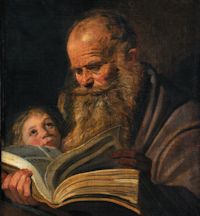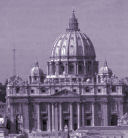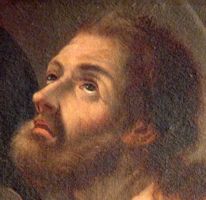Ordinary Time: September 21st
St. Matthew, Apostle and Evangelist
Other Titles: Levi
» Enjoy our Liturgical Seasons series of e-books!
At the time that Jesus summoned him to follow Him, Matthew was a publican, that is, a tax-collector for the Romans. His profession was hateful to the Jews because it reminded them of their subjection; the publican, also, was regarded by the pharisees as the typical sinner. St. Matthew is known to us principally as an Evangelist. He was the first to put down in writing our Lord's teaching and the account of His life. His Gospel was written in Aramaic, the language that our Lord Himself spoke.
St. Matthew, Apostle and Evangelist
No one was more shunned by the Jews than a publican, who was a Jew working for the Roman enemy by robbing his own people and making a large personal profit. Publicans were not allowed to trade, eat, or even pray with others Jews.
One day, while seated at his table of books and money, Jesus looked at Matthew and said two words: "Follow me." This was all that was needed to make Matthew rise, leaving his pieces of silver to follow Christ. His original name, "Levi," in Hebrew signifies "Adhesion" while his new name in Christ, Matthew, means "Gift of God." The only other outstanding mention of Matthew in the Gospels is the dinner party for Christ and His companions to which he invited his fellow tax-collectors. The Jews were surprised to see Jesus with a publican, but Jesus explained that he had come "not to call the just, but sinners."
 St. Matthew is known to us principally as an Evangelist, with his Gospel being the first in position in the New Testament. His Gospel was written to convince the Jews that their anticipated Messiah had come in the person of Jesus.
St. Matthew is known to us principally as an Evangelist, with his Gospel being the first in position in the New Testament. His Gospel was written to convince the Jews that their anticipated Messiah had come in the person of Jesus.
Not much else is known about Matthew. According to tradition, he preached in Egypt and Ethiopia and further places East. Some legends say he lived until his nineties, dying a peaceful death, others say he died a martyr's death.
In the traditional symbolization of the evangelists, based on Ezech. 1:5-10 and Rev. 4:6-7, the image of the winged man is accorded to Matthew because his Gospel begins with the human genealogy of Christ.
Patronage: Accountants; bankers; bookkeepers; customs officers; security guards; stock brokers; tax collectors; Salerno, Italy.
Symbols and Representation: Angel holding a pen or inkwell; bag of coins; loose coins; halberd; inkwell; king; lance; man holding money; man holding money box and/or glasses; money bag; money box; purse; spear; sword; winged man; young man; book; man sitting at a desk.
Highlights and Things to Do:
- Do something for the needy: money for missions, donations of clothing or toys, canned goods drive, etc.
- Take time to read St. Matthew's Gospel. He makes frequent reference to the fulfillment of prophecies because he wrote to Jews and to Jewish Christians.
- Discuss St. Matthew's call from Christ "Follow me" with your children and how we are all called to belong to the family of God.
- From the Catholic Culture podcasts:
- Criteria: The Catholic Film Podcast: Pasolini’s Gospel According to Matthew (1964) w/ Heather King
- atholic Culture Audiobooks: St. John Chrysostom—Homily 33 on the Gospel according to St. Matthew read by James Majewski
- See Catholic Culture's Church Fathers Collection to read various commentaries and homilies on the Gospel of Matthew.
- Learn more about St. Matthew:
- Watch this video about St. Matthew.
- Pray for those who work for financial institutions.
- Read St. Matthew: a Patron Saint for Bankers and Accountants.
- See John Dillon medieval archives for images of St. Matthew.
- Make Silver Dollar Pancakes in honor of St. Matthew. Use this recipe on Catholic Cuisine's website or one of the suggestions Catholic Culture offers under recipes.
- Catholic Cuisine has several creative suggestions for foods on this evangelist's feast day.
Meditation: Ember Saturday, A day for expiation and thanksgiving!
This excerpt from Pius Parsch is based on the 1962 Missal. The current Missal does not include special propers and readings for Ember Days.
1. Holy Mass (Venite). Ember Saturday is the official thanksgiving day for all the blessings of the past quarter-year. Especially in autumn when we garner the fruits of nature should we be more conscious of God’s Providence both in the temporal and spiritual orders. In ancient times today’s Mass served as a thanksgiving sacrifice and as a renewals of the Christian covenant with God. The text presumes that the Ember days are the Christian counterpart to the Old Testament feasts of Atonement and Tabernacles, highlighting penance and and gratitude respectively.
The liturgical celebration, observed during the night between Saturday and Sunday and of obligation for all the faithful, was unusually festive. The faithful gathered at St. Peter’s for an entrance song the Invitatory (Psalm 94) was sung. The first four Lessons belonged specifically to the night-vigil and formed a greeting worthy of the enthroned King. The Readings tap the marrow of the Ember celebration, its connection with the Jewish feasts of the seventh month, Yom Kippur and the feast of Tabernacles. The autumn Ember days are days of penance for past failings and of gratitude for the harvest (and redemption); such too is the spiritual import of the Lessons. The first reviews the Mosaic legislation concerning the Day of Atonement, the second concerning the feast of Tabernacles, Israel’s great thanksgiving feast.
The two Graduals echo their respective Lessons; the first “Forgive” (Day of Atonement), the second, “How lovely are Thy tabernacles” (feast of Tabernacles). The third and fourth Lessons, from the prophets Micheas and Zacharias, are comforting messages in which God reaffirms His readiness to forgive the sins of His people and to grant them good things provided they remain faithful. God is also concerned over the manner in which we fast: “The fast of the fourth month, and the fast of the fifth, and the fast of the seventh, and the fast of the tenth shall be to the house of Judah joy and gladness and a great solemnity!” By which our Ember days, of course, are meant. The Orations offer God our festive fast and plead forgiveness. As on other Ember Saturdays, the fifth Lesson is already part of the morning service; the assembled faithful are praying Lauds; the three youths in the fiery furnace prefigure the resurrection of Christ and of Christians.
In the Epistle St. Paul shows how the ceremonies of the old covenant were types of the new; our day of atonement is Good Friday when Christ, the divine High Priest, entered the most holy sanctuary of heaven with His own Blood and wrought eternal redemption; every Mass is Good Friday repeated. In the Tract we chant the shortest Laud psalm as we express our gratefulness for God’s merciful work of redemption and HIs fidelity in fulfilling the prophecies.
Presently the High Priest Himself appears, first “teaching on the Sabbath” (in the Foremass), then offering Himself (in the Oblation). The unfruitful “fig tree in the orchard” and the “bowed-down woman” are the faithful. God is the landlord, Christ the pleading gardener; till now we have been unfruitful.
We also resemble the bowed-down woman; wholly taken up with earthy concerns, too often we are “unable to look upward”; but on this Christian Sabbath, Christ seeks “to free us from the bonds of Satan” and make us spiritually “erect.” Thus the Gospel insinuates the workings of grace in today’s holy Sacrifice.
At the sacrificial Banquet we once more recall the institution of the feast of Tabernacles as a remembrance of the deliverance from Egypt and the wanderings through the wilderness—for the Eucharist is the fulfillment of those two historical events by providing deliverance from sin and the true Manna from heaven. A classic, thought-packed Postcommunion: May the sacramental energy of the Eucharist realize its power in us, and may we one day enjoy face to face what now we see in a veiled manner. Three realities are noted: the first is the sign—this shows the sacrament. Underneath the sign is hidden the second reality, the sacrament’s efficacy—what the sacraments contain. And lastly, the rerun veritas, the future unveiling.
2. A “Spiritual Renewal” Day. For a “day of recollection” no better meditation points could be found than those in the Lessons of today’s Ember Mass. Of the two areas of thought proper to the formulary, viz., the Ember festivity is the Christian “Day of Atonement” and the Christian Feast of Tabernacles (or thanksgiving day at harvest time), let us pursue the former in some detail.
a) The Old Testament type. The Day of Atonement, Yom Kippur, was the great penitential observance of Mosaic Law, Israel’s “confession day.” With us “penance days” are not feast days, but among the Jews it was otherwise; Yom Kippur was a day of strict rest, absolutely no type of work was permitted and the spirit of the occasion was festive, celebrabitis. The day’s liturgy exemplified the nation’s effort to expiate sin; on this one day of the year, the high priest would enter the Holy of Holies with sacrificial blood and sprinkle the ark of the covenant in atonement for his own and his people’s sins. Meanwhile the people did penance through fasting, humbling themselves before Yahweh.
b) The New Testament fulfillment. Mosaic festivals were shadows which took on flesh and blood in the Church of Christ. Good Friday was the real, the unique day of atonement in the sight of God. How well St. Paul affirmed this truth in the Epistle of today’s Mass: “Christ appeared as the high priest of coming (Messianic) blessings. He entered the greater and more perfect tabernacle not made by human hands (i.e., heavenly in nature) not with the blood of goats and steers but with His own blood—once and for all He entered the (heavenly) Holy of Holies—after He had effected an eternal redemption (i.e., one with lasting effects in contrast to the annually repeated Jewish day of atonement).” For the sacrifice on the Cross constituted the perfect reconciliation of God with mankind; and every holy Mass, as it renders present that sacrifice on Golgotha, is Yom Kippur par excellence.
Every Sunday then would be the Christian atonement feast. But because we Christians are so irresponsive and dull to the inner nature of spiritual realities, holy Church introduced special expiation days during the course of the Church year. Among these are Ember days. Ember Saturdays, particularly September Ember Saturday, have preserved best this original spirit. Anyone who seeks to develop his spiritual life on a liturgical basis would have to use the Ember days during the four seasons as times of genuine spiritual renewal. The peculiar means of keeping these days is evident from the liturgy itself—acts of penance and fasting, confession of sin, humbling ourselves before God and neighbor, and nevertheless rejoicing, in the best sense of the word. Our conduct would exemplify the prophet’s statement (fourth Lesson), “The fast proper to the fourth, fifth, seventh and tenth months (i.e., the four Ember weeks) should mean joy and exultation to the house of Judah (viz,, Catholics) and high festival; you only need to love truth (obedience) and peace.”
c) Application. God appeals directly to my heart in the Gospel. The two parables, one in word and one in sign, should move me deeply. I am that barren fig tree. The infinitely just God is the landlord, our Savior the pleading caretaker. If God should summon me to His judgement seat today (the command to destroy the tree), would there be any “fruit”? To what extent would I resemble the barren fig tree? Why does it occupy ground? But Christ intercedes, says a kindly word in my behalf: “Perhaps there will be some return—next crop! If not, it can then be cut down.” The coming quarter-year mark must mark a change, genuine improvement.
The parable in sign is equally instructive. My soul is so badly bowed down to earth, it find “looking upwards” toward heavenly realities extremely painful. Christ must make me stand erect again. The coming season as no other is the season of hope, of preparation for the parousia, of longing for the heavenly Jerusalem, of expectation for the returning Lord. Jesus, have mercy. Free me from stooping down to the earthly, the sensual. Straighten me out for heaven. Now! Jesus, have mercy.
—Excerpted from Pius Parsch, Year of Grace, Volume 5.
 Ember Saturday of the Autumn or September Embertide
Ember Saturday of the Autumn or September Embertide
Station with San Pietro in Vaticano (St. Peter's in the Vatican):
We celebrate this closing and thanksgiving day of Ember Week "in the house of Peter." It is the night between Saturday and Sunday as in the spirit of the ancient Church we gather at St. Peter's, the station for all Christendom. "Let us fast on Wednesday and Friday, and on Saturday let us celebrate the vigil at the tomb of blessed Peter the Apostle, by whose merits and prayers we believe that we shall be aided, so that we may please our merciful God by our fast and prayer." That was the announcement made by the Great Leo to the holy people of God fifteen centuries ago. That is the program for Christ’s flock of today. "Let us celebrate the vigil at the tomb of blessed Peter"! This ember vigil, like all other vigils, was held at night and ended at daybreak with the celebration of the Holy Eucharist, the mystery of "Light and Life" (phos-zoe). "Watching, prayer, fast, sorrow for past transgressions, resolutions for the future, conferring of holy orders, offering of grapes (wine), and the climax, the eucharistic Banquet, were the eight milestones on this nocturnal journey. (Msgr. Martin Hellriegel)
For more on San Pietro in Vaticano, see:
For further information on the Station Churches, see The Stational Church.






